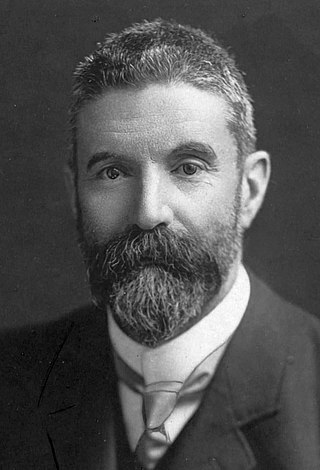
Alfred Deakin was an Australian politician, statesman and barrister who served as the second prime minister of Australia from 1903 to 1904, 1905 to 1908 and 1909 to 1910. He held office as the leader of the Protectionist Party, and in his final term as that of the Liberal Party. He is notable for being one of the founding fathers of Federation and for his influence in early Australian politics.

Kathleen Kylie Tennant AO was an Australian novelist, playwright, short-story writer, critic, biographer, and historian.
Ronald Grant Taylor was an English-Australian actor best known as the abrasive General Henderson in the Gerry Anderson science fiction series UFO and for his lead role in Forty Thousand Horsemen (1940).

Sir Walter Logie Forbes Murdoch, was a prominent Australian academic and essayist famous for his intelligence and wit. He was a founding professor of English and former Chancellor of the University of Western Australia (UWA) in Perth, Western Australia.
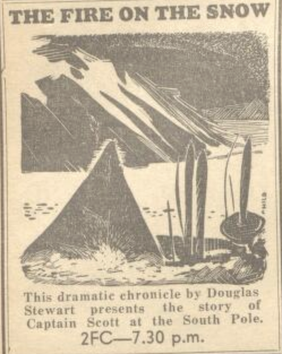
The Fire on the Snow is a 1941 Australian verse play by Douglas Stewart about the Terra Nova Expedition to Antarctica by Robert Falcon Scott. It premiered on ABC radio on 6 June 1941 to great acclaim and inspired a series of Australian verse dramas on ABC radio.
Rohan Deakin Rivett was an Australian journalist and author, and influential editor of the Adelaide newspaper The News from 1951 to 1960. He is chiefly remembered for accounts of his experiences on the Burma Railway and his activism in the Max Stuart case.
The Square Ring is a 1952 play by Ralph Peterson.
The Playwrights' Advisory Board was an Australian organisation established in 1938 to assist the cause of Australian playwriting. It was established by Leslie Rees, Rex Rienits and Doris Fitton. Its functions included negotiating productions with theatres, acting as an intermediary in the nomination and collection of royalties, advising theatres and playwrights on scripts, and holding script competitions. Members of the board included names such as Dymphna Cusack and Sumner Locke Elliott.
Daybreak is a 1938 Australian play by Catherine Shepherd.
Sons of the Morning is a 1945 verse drama Australian play by Catherine Duncan. It was originally written for radio.
The House That Jack Built is a 1951 Australian play by George Farwell about the Rum Rebellion.
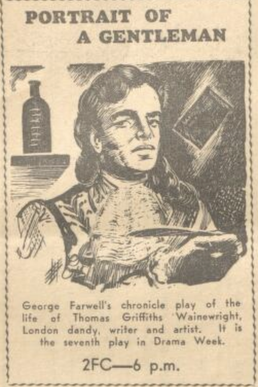
Portrait of a Gentleman is a 1940 Australian radio play by George Farwell about Thomas Griffiths Wainewright. It was the first time Wainewright's life had been dramatised.
Out of This Nettle is a 1952 Australian radio play by Max Afford. It is a drama set in the sugar cane region of Queensland.
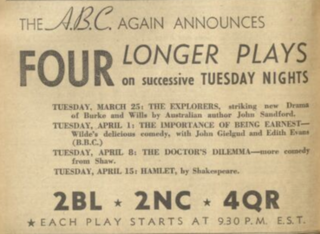
The Explorers is a 1952 Australian radio play about the Burke and Wills expedition by John Sandford. It was Sandford's first play.
Krubi of Illawarra is an Australian radio verse play by Coral Lansbury. It was her first notable play and was written when she was nineteen.
Jane, My Love is a 1951 stage play by Catherine Shepherd about Jane Franklin and John Franklin.
Spiegel the Cat is a 1952 Australian radio play by David Martin. It was adapted from Spiegel the Cat, a story from the Swiss writer Gottfried Keller.
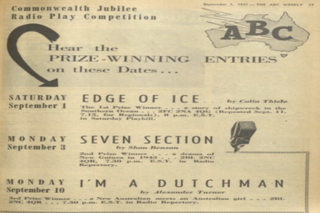
The Edge of Ice is a 1951 Australian radio play by Colin Thiele told the story of a handful of castaways in a boat in Antarctica.
The Commonwealth Jubilee play competition was a 1951 Australian play competition held to celebrate Australia's Jubilee Year. The competition was for the best plays dealing with the Australian life or an Australian character and was organized by the Jubilee Federal Arts Sub-Committee.
I'm a Dutchman is a 1951 Australian radio play by Alexander Turner about a Dutch artist in Australia.







